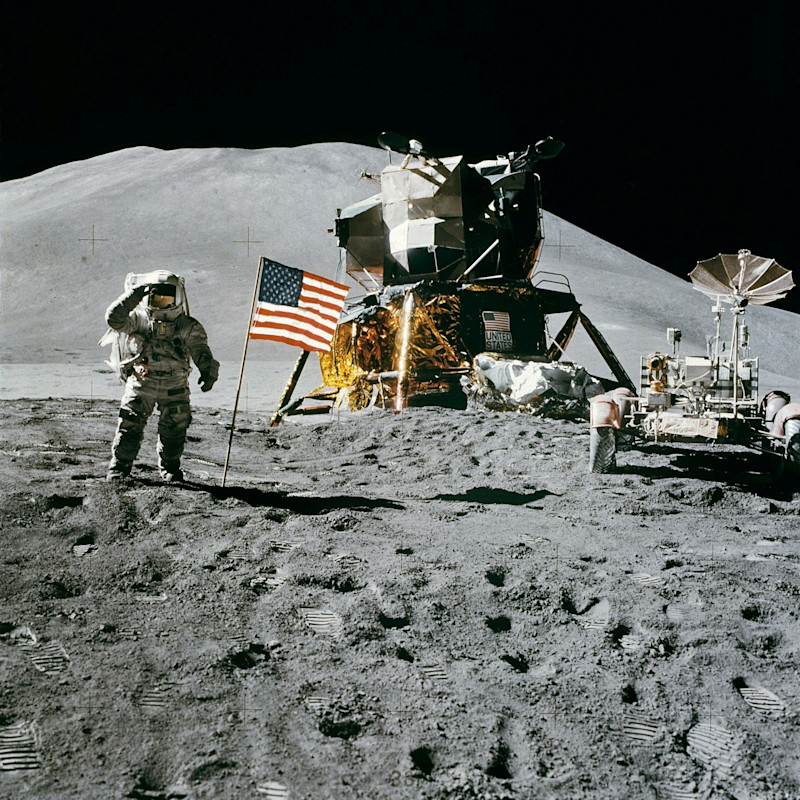
Prepare to have all your beliefs turned upside down as we unveil the cognitive quirks behind famous misquotes, collective false memories, and the pervasive power of repetition
Many people think that fake news is a very new phenomenon, but really, it’s a lot older and much more common than you think. Throughout history, many historical facts and famous quotes have been misquoted or misinterpreted, leading to widespread misconceptions about their original phrasing or context. We have seen it happen in popular movies, folk culture, and even some of the most well-known global events, but what is the cause of this mass misunderstanding?
One Giant Leap for the Imagination
One of the most iconic examples of misquoting is Neil Armstrong’s supposed declaration, “One small step for man, one giant leap for mankind.” Whilst this seems to be the version everyone speaks about, Armstrong intended to say, “one small step for a man,” which would emphasise the individual act within the broader human achievement. Despite his attempts to clarify this over the years, the misquote has persisted in popular culture, becoming the de facto truth in many people’s eyes.

Similarly, the phrase “Let them eat cake” is commonly attributed to Marie Antoinette as an example of her supposed indifference to the plight of the poor. However, there is no historical evidence she ever uttered these words with this misattribution having been debunked by historians, yet still continuing to be a popular anecdote.
Whose Line Is It Anyway?
In the realm of film, Forrest Gump’s memorable line, “Mama always said life was like a box of chocolates. You never know what you're gonna get,” is often misquoted as “life is like a box of chocolates.” The difference in tense subtly changes the meaning, yet the misquote remains more familiar to many and is possibly even more iconic because of this.
Another classic cinematic example involves Tom Hanks in “Apollo 13,” where his line “Houston, we have a problem” is widely recognised, and often used to suggest an impending calamity. The actual transmission from Jack Swigert, the command module pilot on that ill-fated voyage, was “Ah, Houston, we’ve had a problem,” but the film’s version has overshadowed the real-life phrasing.
The Mandela Effect
These examples illustrate how easily quotes can be altered in collective memory and this phenomenon is very closely related to the Mandela Effect, a term coined by paranormal researcher Fiona Broome in 2009. Broome named it after noticing that many people, including herself, remembered Nelson Mandela dying in prison in the 1980s, despite him being released in 1990 and living until 2013. This collective false memory prompted further investigation into similar occurrences with some incredibly surprising results.
Some notable examples of the Mandela Effect taking shape include the belief that C-3PO from “Star Wars” is entirely gold (he has a silver leg), the existence of a peanut butter brand called Jiffy (it’s just Jif), and the spelling of the children’s book series as “The Berenstein Bears” (the correct spelling is “The Berenstain Bears”). Famous movie misquotes also fall into this category, such as “Luke, I am your father” from “The Empire Strikes Back” (correctly “No, I am your father”), and “If you build it, they will come” from “Field of Dreams” (correctly “If you build it, he will come”).
Possibly one of the weirdest and most confusing examples of the Mandela Effect is the collective false memory of a 1990s movie called “Shazaam,” starring the comedian Sinbad as a genie. Despite countless people vividly recalling the film and even specific scenes from it, no such movie ever existed. This perplexing phenomenon has led to numerous theories and discussions online, with some suggesting it might be confused with the 1996 film “Kazaam,” featuring Shaquille O'Neal as a genie.
The Mandela Effect raises intriguing questions about how and why so many people share these false memories. Despite attempts to find simple explanations, such as visual errors or misinformation spread online, research indicates that the effect is more complex and not easily explained by any single factor. It can be sometimes put down to the effects of groupthink, a phenomenon that occurs when a group of individuals reaches a consensus without critical reasoning or evaluation of the consequences or alternatives, but this still doesn’t explain where the initial misconceptions stem from.
The Truth, The Real Truth, and Nothing but the Truth
Another related cognitive bias is the illusory truth effect, the tendency to believe false information to be true after repeated exposure. First identified in a 1977 study at Villanova University and Temple University, this effect demonstrates that repetition can make statements easier to process, leading people to accept them as true. This is significant in fields like advertising, news media, and political propaganda, where repeated assertions can shape public perception and belief.
The illusory truth effect occurs because familiarity can sometimes overpower rationality. Even when individuals know the correct information, hearing a falsehood repeatedly can cause them to believe it due to the ease with which their brain processes familiar statements. This cognitive bias highlights the importance of critical thinking and vigilance in evaluating the information we encounter.

The human mind is a beautiful, brilliant, and confusing thing, and studying the persistence of misquotes and the Mandela Effect underscores the complexities of human memory and perception. They remind us of our susceptibility to cognitive biases and the influence of repetition on our beliefs. So, before you start suggesting that they eat cake, just remember that famous Shakespeare line, “To be or not to be, that is the question... now has anyone seen my phone?”
For more related updates and to Katch us covering similar topics, watch this space!
Katch our game-changing PR and Communications, Social Media, Branding and Design, Brand Consultancy, Digital Marketing, and Global Communications services to help your brand make noise. Get in touch with our 360-Marketing agency in Dubai, Qatar, Saudi Arabia, and London, and let’s get the conversation started!
